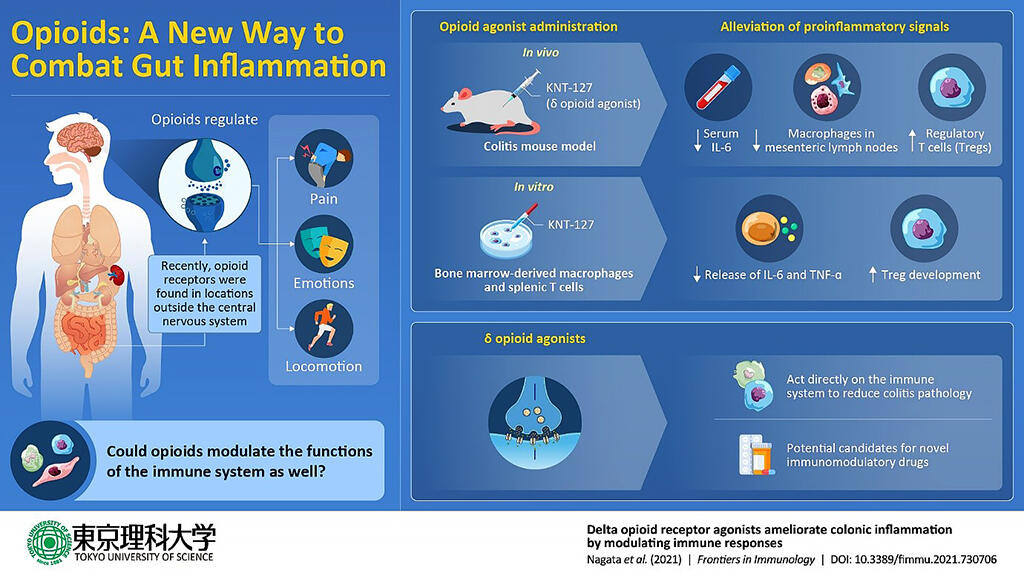A research group comprised of Professor Chiharu Nishiyama, Department of Biological Science and Technology, Faculty of Advanced Science and Technology, of Tokyo University of Science, graduate students Kazuki Nagata and Ayumi Okuzumi, and Specially Appointed Professor Hiroshi Nagase at the International Institute for Integrative Sleep Medicine, University of Tsukuba revealed that opioids might control the inflammatory response of immune cells and alleviate inflammatory bowel disease, as determined by analyzing a combination of δ opioid-selective agonists and an experimental mouse system.

(Provided by Tokyo University of Science)
The phenomenon that the mental state affects general health, as indicated by the idiom "Sickness and health start with the mind" has been recognized since ancient times. However, research on the gut-brain axis, a phenomenon in which stress causes deterioration of intestinal health and, conversely, inflammation in the intestine affects brain health, is attracting considerable attention. Opioids are peptides synthesized within the body, including natural products such as morphine and artificially synthesized compounds, affecting sensations and emotions by interacting with opioid receptors.
The research group investigated the effect of the δ opioid-selective agonist (KNT-127) in mice exhibiting dextran sulfate sodium (DSS) -induced colitis, an animal model of irritable bowel syndrome (IBD). In KNT-127-administered mice, the research group documented improved disease activity index (DAI) score, a pathological evaluation, reduced weight loss, and improvement in the shortening of the large intestine attributed to atrophy, a symptom of IBD. In addition, intraperitoneal administration of a KNT-127 derivative that lacked blood-brain barrier penetration improved the pathological condition; however, no effect was observed after the intraventricular topical administration of KNT-127. Moreover, mRNA expression, such as the expression of opioid receptors in the brain, was unaltered. Through this, the researchers revealed that the KNT-127-mediated alleviation of colitis was not mediated via actions on the central nervous system (CNS).
In addition, the serum levels of interleukin (IL)-6, an inflammatory cytokine, and C-reactive protein, an inflammatory marker, were reduced following KNT-127 administration during the advanced disease condition. Furthermore, the numbers of macrophages, known inflammatory cytokine-producing cells, were reduced in the mesenteric lymph nodes during the advanced disease stage, indicating that KNT-127 may regulate macrophage migration. Furthermore, regulatory T cell differentiation was promoted during the convalescent phase.
On verifying the direct effect using an in vitro experimental system, the researchers demonstrated that KNT-127 could suppress the macrophage-mediated production of tumor necrosis factor (TNF)-α and IL-6 and promote regulatory T cell differentiation. These results suggest that KNT-127 could regulate immune cell localization, activity, and differentiation in the peripheral tissue of the large intestine, as well as in neighboring tissues, thus alleviating colitis.
According to Professor Nishiyama, opioid compounds may directly regulate the activation and differentiation of immune cells and confer beneficial effects on inflammatory diseases independent of the CNS. Furthermore, the mechanism whereby the brain controls the function of immune cells distributed throughout the body remains interesting. With continued detailed analysis under the theme of 'Disease is from the mind,' the researchers plan to unravel advanced biological phenomena through which the complex reactions of the immune and nervous systems mutually regulate each other.
This article has been translated by JST with permission from The Science News Ltd.(https://sci-news.co.jp/). Unauthorized reproduction of the article and photographs is prohibited.




